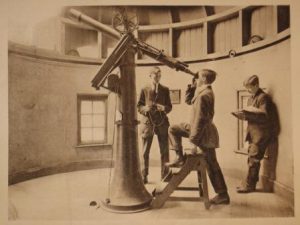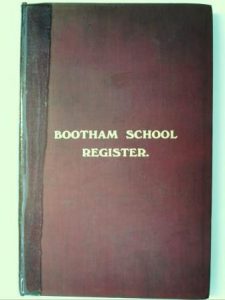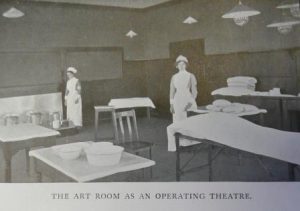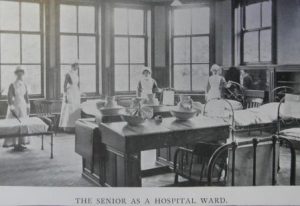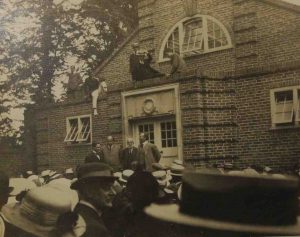Many thanks to Claire, one of the volunteers, for researching this post.
The first School Camp took place in 1905, on a farm “on the edge of the cliff near the middle of the sweep of Robin Hood’s Bay”, according to ‘Bootham’ magazine (October 1905 edition). There had long been plans for a holiday camp for boys from York. Before the first camp, much planning took place:
“Mr Sturge and Mr Spencer Smith had given much anxious thought to the careful planning of details. Preliminary tents had been erected in the garden of ‘49’; red and blue bunting had been wrestled with in the making of ‘B.S.C.’ flags; many solemn consultations were held on the merits of penny tin plates, and coloured linens for badges; the resource of the workshop had resulted in an excellent noticeboard; boiled puddings, cakes and vegetables had been sent in by masters’ wives and other friends; and many teas and chats on the engrossing subject had gone on in the Head’s garden.”
The camp was made up of staff, some boys from Bootham, and some boys from York.
We have in the archive a set of diaries for the ‘Lads’ Club Camps’ (as they become known), running from 1911 until 1968 (with some gaps). Here are some extracts from the diaries.
1911 – The very first diary entry was the 22nd July 1911, in Scarborough. Twelve officers and forty-five lads camped on this occasion.


1922 – The diary describes the layout of the camp along with the camp rules. “No smoking, no spitting about camp, preferably not elsewhere, barbed wire not to be climbed, use styles, no one to leave camp or go to the stream without notification to a commandant No washing in the water drawing bucket, iron basins provided, foul language and swearing discouraged, especially by officers!”.

1933 – The camp took place at Thornton Dale, visiting “Farmer Elliott at Paper Mill Farm. Milk and butter were provided by the farm, water from the stream or spring on the hillside. Farmer Elliott allowed the lads to dam the stream “to make a deeper bathing pool”.


1954 – Camp was held at Bowbridge, Rievaulx. Nine days were spent there with, five staff, twelve boys from Bootham (officers) and twenty-three boys from across York.

The “variety and quality of food was good, Friends of Bootham School donated tinned stuffs, biscuits, cakes and other luxuries”. The accounts give an idea of what supplies were needed.

